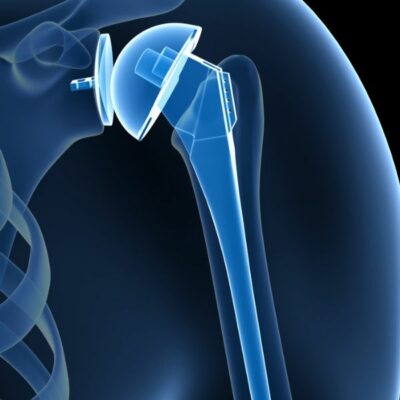Shoulder Surgeon

Have you sustained a failed shoulder replacement? If so, you may be a candidate for a revision shoulder replacement. The shoulder surgeon, Dr. James Mazzara provides diagnosis and both surgical and nonsurgical treatment options for patients in the Manchester, South Windsor, Enfield, Glastonbury and surrounding Hartford communities area who have experienced a failed shoulder replacement. Contact Dr. Mazzara’s team today!
What is Revision Total Shoulder Replacement?
A total shoulder replacement is a surgical procedure that replaces the head of the upper arm bone (humerus) and the rubbery-cartilage of the shoulder blade (glenoid cavity) that holds the humerus in place in the joint. Metal and plastic components called prosthesis replace the damaged tissues and bone in the shoulder. The procedure usually has good results, but occasionally a revision total shoulder replacement may be necessary due to persistent severe pain, stiffness or instability. Dr. James Mazzara, shoulder surgeon serving Manchester, South Windsor, Enfield, Glastonbury and surrounding Hartford communities is extremely skilled at revision total shoulder replacement.
Why Would I Need Revision Total Shoulder Replacement?
Total shoulder joint replacement is a complex procedure and can fail for several reasons. Complications can occur with the formation of osteophytes (bone spurs,) scar tissue, weak supporting muscles, soft tissue imbalance or a new injury. Other complications may result if the prosthesis used in the total shoulder joint replacement is too large or becomes too loose. Poor participation in a rehabilitation program or overstraining the repaired tendons too early can also cause surgical failure and the need for a revision total shoulder replacement.
To Revise or Not to Revise?
The decision to undergo a revision total shoulder replacement requires a thorough patient history and physical examination. Dr. Mazzara may request new x-rays and other imaging such as an MRI, or CT Scan to accurately assess the shoulder joint problem. Dr. Mazzara will consider the following:
- Is the shoulder joint infected?
- Although uncommon, if the problem is infection, revision total shoulder replacement and removal of the prosthesis is not always necessary. Depending on the type of infection and when it is discovered, the patient may be treated with antibiotics in an early-stage infection. Late-stage infections may require further intervention and revision total shoulder replacement.
- Is the shoulder joint unstable?
- If the problem is instability, the cause must be identified and rectified. Instability can be caused by incorrect restoration of the arm bone (humerus) length or several other factors.
- Is the new joint worn?
- Mazzara will review new shoulder images to determine if the joint implant has worn, if there is an imbalance and will help the patient decide if a revision is needed.
- Has the joint loosened since the total shoulder replacement?
- If the shoulder joint has loosened post-replacement, Dr. Mazzara will consider the patient’s age, rotator cuff status and available bone stock before deciding on the type of revision needed.
- How is the rotator cuff?
- A torn or damaged rotator cuff can cause pain, weakness or a catching sensation in the shoulder joint and may require a revision total shoulder replacement.
The main goal of a revision total shoulder replacement is to alleviate pain and increase range of motion. Patients who have had a total shoulder replacement but are experiencing pain, functional deficits or loss of range of motion should be evaluated by Dr. James Mazzara, who has extensive experience in revision surgery.
If you are suffering from pain and loss of motion after a total shoulder replacement, you may need a revision surgery. To discuss your unique case or to find out more about revision total shoulder replacement, please contact Dr. James Mazzara, orthopedic shoulder surgeon in Manchester, South Windsor, Enfield, Glastonbury and surrounding Hartford communities.
